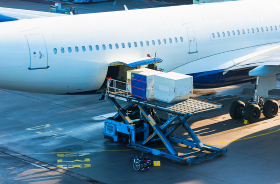IATA sees 2021 as “another tough year” for air cargo sector
New Covid strains and outbreaks stall recovery of passenger demand, shackling airlines, groups says.

Demand for air cargo fell by 10.6% in 2020, showing its largest year-on-year drop since 1990 and even outpacing the 6% fall in global trade in goods, according to a study from the International Air Transport Association (IATA).
Despite that slump, capacity was still tight in the air cargo sector because global capacity fell even faster, shrinking by 23.3% in 2020 as airlines idled large portions of their fleets in the face of an evaporation of passenger traffic as travelers stayed home during the coronavirus pandemic, IATA said.
Those trends modified slightly in the fourth quarter, as global demand in December was just 0.5% below previous-year levels. But again, capacity was even less, registering at 17.7% below previous-year levels.
Looking into the new year, there is no end in sight for the capacity crunch as long as the passenger market recovery remains stalled, IATA said. “Air cargo is surviving the crisis in better shape than the passenger side of the business,” Alexandre de Juniac, IATA’s director general and CEO, said in a release.
“For many airlines, 2020 saw air cargo become a vital source of revenues, despite weakened demand. But with much of the passenger fleet grounded, meeting demand without belly capacity continues to be an enormous challenge. And, as countries strengthen travel restrictions in the face of new coronavirus variants, it is difficult to see improvements in passenger demand or the capacity crunch. 2021 will be another tough year,” de Juniac said.
As bad as the year was for the air cargo sector, the passenger side of the business had it even worse, IATA found. Passenger demand (as measured by revenue passenger kilometers or RPKs) fell by 65.9% compared to the full year of 2019, by far the sharpest traffic decline in aviation history.
“Last year was a catastrophe. There is no other way to describe it,” de Juniac said. “What recovery there was over the Northern hemisphere summer season stalled in autumn and the situation turned dramatically worse over the year-end holiday season, as more severe travel restrictions were imposed in the face of new outbreaks and new strains of Covid-19.”
In the face of those conditions, IATA said it is urging governments to work with industry to develop the standards for vaccination, testing, and validation that will give them confidence to reopen borders and resume international air travel once the virus threat has been neutralized.
2020 was the worst year for #AirCargo demand since IATA began monitoring performance in 1990 due to #COVID19 #Aircargo continues to suffer from a lack of capacity due to the grounding of passenger fleets.??https://t.co/aj476Gy09x pic.twitter.com/c1RPOWijg4
— IATA (@IATA) February 3, 2021
Related Articles
Copyright ©2024. All Rights ReservedDesign, CMS, Hosting & Web Development :: ePublishing